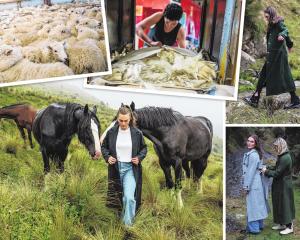
There are plenty of creatures from which we recoil, and often wisely, but few arouse the revulsion, the throat catch of nausea, that a fat black spider does, even if we know it to be harmless.
In a television documentary David Attenborough demonstrated the art of the trap-door spider. It lurked, as the name suggests, beneath a trap door and was alerted to the presence of prey by strands of silk that radiated from its lair.

And though he knew that the spider was there and that it was going to leap out, and though he was more than a metre away from the spider, and though he was roughly 100,000 times larger than the spider, and though he was in no danger whatsoever from the spider, and though we have all seen him rolling happily in the long grass with a family of 30-stone gorillas, and though indeed there can be hardly anyone on the planet more familiar with its many and varied forms of wildlife, when the inch-long spider leapt from its hiding place Sir David Attenborough jumped like a stabbed cat, then turned to the camera with a face drained by fear.
Here, said that wise old face, was nightmare. It must go a long way back.
A while ago I was watching a wolf spider make its way along a window sill in my kitchen. Wolf spiders are hunters that track down their prey instead of trapping them in webs. They bite but they are largely harmless to humans and they come in a range of sizes.
This one was a medium. It could move quite fast. I was debating whether to kill it when my knee touched a handtowel hanging from a cupboard handle beneath the kitchen bench and dislodged it. I was wearing shorts. The towel slithered down my leg. I leapt backwards. My heartrate doubled in a second. I cried out, then sank with weakness and relief when I realised what it had been. The sight of the spider had put me on jungle red alert. The touch of the towel had triggered the alarm. My 21st century kitchen had become primeval soup.
On the arachnophobic scale I am probably somewhere in the middle. At one end stand those people who like nothing better than to appear on television cradling a palm-sized tarantula. They’re on television because they’re freaks. At the other end are characters like the 14-year-old boy I taught many years ago. If there was a spider in the room he left. He didn’t ask to leave, nor did he take his books with him. He simply fled. He went on to play professional rugby.
Attercop is the Old English for spider. It means poison head. The cop in attercop is the cob in cobweb, and cobwebs are a staple of horror. Halloween is draped in them. They thrive on Dickensian neglect. They are the world reclaimed from duster and brush. And every night a spider spins one across the top right corner of a ranchslider at my house.
The ranchslider gives access to my deck. Cantilevered off the deck is a bird table I built so I can watch them breakfast while I do. Each morning I head out through the ranchslider with a plate of leftovers, seeds, bread, rice, fruit. Most mornings, before I step through I remember to remove the web with a bamboo stick that I leave by the wall for the purpose. But sometimes I forget and blunder forehead first into it. Immediately I drop all that I am carrying and wipe frantically at the threads, unnerved by their sticky invisibility, unnerved even more by the thought of their creator being about my person.
Today I saw that creator. Perhaps because the mornings are getting darker the beast was still at the centre of its web, a hunched and hefty thing, lurking. Attercop. I felt the hackles of atavistic distaste. I didn’t hesitate. On the windowsill stood a can of fly spray. I put on my glasses, read the small print, found the answer I hoped for, uncapped my weapon and turned to kill. The web was empty. The beast had gone.
I slid the door open, destroyed the web, looked about for the creature, feeling murderous, guilty and edgily alive, gave up on finding it and fed the birds, those friends to man, or so we fondly think. They eat spiders.
• Joe Bennett is a Lyttelton writer.












